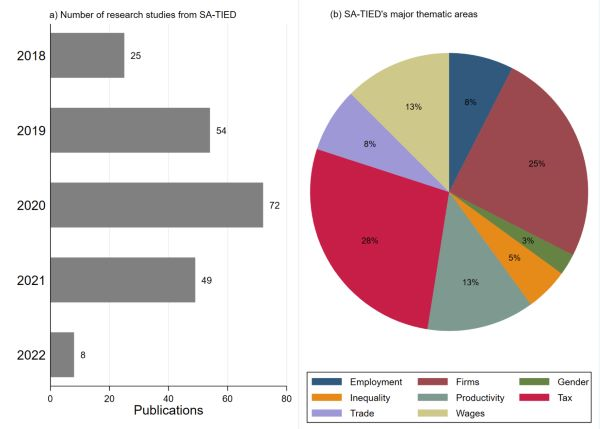Blog
Forging economic progress through a secure data facility lab in South Africa
Data is the key to informed decision-making in today's rapidly changing world. As nations strive to address complex economic challenges, data-driven insights have become indispensable. South Africa is no exception, facing issues like declining GDP per capita, sluggish productivity growth, and rising unemployment. These challenges demand precise, evidence-based solutions.
Enter the National Treasury Secure Data Facility (NTSDF), a pioneering initiative that has influenced thinking around policymaking in South Africa. The NTSDF is more than just a repository of administrative data; it's a gateway to unlocking policy insights that were previously unattainable. This has been possible thanks to the successful tripartite collaboration between the South African National Treasury (NT), the South African Revenue Services (SARS) and UNU-WIDER and other stakeholders in SA-TIED.
Since its inception, the lab has attracted high-caliber national and international researchers. The NTSDF democratizes data at its core, making it accessible for research projects that delve deep into economic complexities. Globally, the trend toward data-driven policymaking is gaining momentum. While valuable, traditional datasets, such as surveys, often need to catch up on capturing the intricacies of modern economies. This limitation has led to the rise in the use of administrative data, filling gaps left by conventional data resources.
Leading international organizations, including the World Bank and IMF, recognize the potential of administrative data. It encompasses a broad spectrum, from school enrollments and healthcare facilities to energy billing, road infrastructure, and tax records. This wealth of information allows for precise and targeted policy responses.
A catalyst for data-driven policy development
In South Africa, the NTSDF stands out as a unique tax data lab featuring anonymized datasets on Corporate Income Tax (CIT), Value Added Tax (VAT), Personal Income Tax (PIT), and Customs, among others. The lab's rigorous anonymization process is a collaborative effort between SARS and UNU-WIDER. Since its establishment in 2018, the lab has had increasing users and research outputs. Figure 1(a) depicts the growth of working papers that utilize NTSDF datasets. By 2022, over 208 studies using the datasets on diverse economic topics like business productivity and inequality were published, as shown in Figure 1(b).
Figure 1: Publications and main thematic areas under the SA-TIED programme

NT, SARS, and UNU-WIDER collaborate to ensure the NTSDF lab's success. NT provides infrastructure and management, SARS offers access to tax datasets crucial for the NTSDF, and UNU-WIDER contributes technical expertise for data development and research management. The NTSDF technical team, consisting of nine regular experts, plays a vital role in data extraction and research support.
Administrative data labs: A new era of data-driven insights
Why does this matter? Countries need data for policy creation, adjustment, and assessment. The existing micro datasets, such as enterprise, employment statistics, or labor force surveys, collect critical relevant records on firms. However, in most cases, such data suffers from no-response, attrition, and missing data. In some instances, data is not made publicly available. As such, administrative data helps to overcome some of these shortcomings and shape policies that boost business growth, optimize tax systems, and enhance revenue collection. In South Africa, the absence of firm-level data was a challenge until the NTSDF made tax data accessible. This led to more research projects using firm administrative data to evaluate policies, such as the 50% increase in agricultural minimum wage and the 2015 temporary employment protection legislation. Using administrative data, NTSDF has positioned South Africa ahead of many other developed and developing countries in conducting empirical economic research for policy development.
Data and economic focus areas within the SA-TIED programme
The NTSDF is an integral part of the SA-TIED programme, which aims to support evidence-based policymaking in Southern Africa for inclusive economic growth. It brings together top economic researchers and policymakers to address economic challenges in South Africa across six thematic areas:
- Enterprise development for job creation and growth
- Public revenue mobilization for inclusive development
- Structural transformation, labor markets, and inequality
- Macro-fiscal analysis and policy modeling
- Food, energy, and water in the context of climate change
- Reform implementation
With the NTSDF dataset, SA-TIED harnesses robust empirical evidence to lead collaborative networking and policy dialogues among relevant organizations and civil society organizations, fostering a connection between research knowledge and policymaking.
South Africa is one of the most unequal societies in the world; for example, the top 10% of the population spent 7.9 times more than the bottom 40% in 2015. In addition to that its economy faces significant challenges, including declining GDP per capita, sluggish productivity growth, and rising unemployment exacerbated by COVID-19. In this context, NTSDF plays a vital role in the solutions by enabling research at the firm level, allowing in-depth analysis of issues like revenue mobilization efficiency and the impact of behavioural factors on policy design and evaluation. This research has contributed to policy-yielding publications, technical notes, and policy briefs.
Future prospects
SA-TIED has excelled in evidence-based policy research and the NTSDF has been a pivotal reason for this, providing a unique resource hub for research that can shape future economic policies and facilitate collaboration between researchers and policymakers. It sets a global benchmark for public economic policy research, drawing interest from other African countries like Zambia and Tanzania, who are now considering similar secure tax data labs, or Uganda which is currently implementing its own version of the NTSDF. With over 24 clean datasets and counting, NTSDF is instrumental in driving evidence-based policymaking. I invite all to explore the possibilities of leveraging data for better policy decisions and join us in shaping the future of economic policies in the Southern Africa region.
Aimable Nsabimana is an Economist Research Fellow at UNU-WIDER on the SA-TIED programme.
The views expressed in this piece are those of the author(s), and do not necessarily reflect the views of the Institute or the United Nations University, nor the programme/project donors.
 Join the network
Join the network
